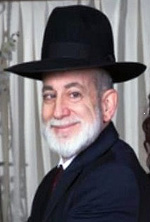By Rabbi Yaakov Marks

SAN DIEGO –“And they shall make an ark of acacia wood, two and a half cubits long, one and a half cubits wide and one and a half cubits high.” (Shemot 25:10) The Talmud Sanhedrin(29a) debates the source from where the concept ‘Whoever adds (to the Commandments) diminishes them’ is derived. Several rabbis derive it from the wording of the measurements used in the construction of the Ark. No matter where this concept is derived, all the commentators concur that if an individual adds onto a Torah commandment or a Rabbinical law, he not only detracts from the essence of the commandment, he might be negating it completely.
In the Passover Haggadah, there is a discussion about the four sons: the wise son, the evil son, the simple son, and the son who could not ask a question. Each of these sons represent the four possible personalities a person could exhibit about his approach to life. While a superficial reading of this well-known portion of the Haggadah might leave, the reader thinking that the questions asked by these sons were simple questions, they are actually profound, philosophical questions which deal with fundamental Jewish thought. The wise son asked, “What are these testimonies, statutes, and laws that our G-d has commanded you?” You respond, “Like the laws of the Passover offering, you may not eat anything after the Passover offering.” What kind of enlightening answer are we giving to this wise son? How can not eating anything after eating from the Passover offering affect his spirituality?
Rabbi Nosson NotaYavonitz in his commentary on the Passover Haggadah Binyan Yerushalyim gives us an insight to the profundity of this answer. He says that the wise son is trying to understand the complexities and the impact that the commandments have on a person. The answer given to the wise son is that G-d’s commandments are so perfect and complete that if some individual tries to add anything to them, they will diminish, and even possibly negate, the entire commandment. The Passover sacrifice is brought forward as an example. A person might think that one extra bite of any other food following the elaborate ceremony that we perform and the amounts of symbolic foods we eat during the Seder will not make any difference in the scope of the whole Passover Seder. The wise son is told that the additional small bite of food will alter the spiritual outcome of his Passover Seder and possibly negate it completely. This answer applies to all of G-d’s perfect commandments that He has lovingly given to us. We are not here to “embellish” G-d’s perfect words; we are here to use them to reach our personal perfection.
The Vilna Goan, Elijah ben Shlomo Zalman, explains in his book Even Shelamah (Chapter 4:16) that there are two possible urges which will undermine a person’s spirituality. Either he will look for or make up loopholes that will allow him to rationalize and not perform some laws properly, or he will add onto the laws, thereby distorting the spirit of the law or making it so difficult he eventually rejects the entire law completely. The Vilna Goan adds that a lot of this manipulation of the law is the result of the individual’s lack of truly understanding the law.
In his book Reshis Chochmah, Rabbi Shem-Tov ben Joseph ibn Falaquera writes that this principle also applies to a person’s ethical behavior. Even ethical behavior, if altered or over-done, is detrimental to a person’s spirituality. Every act a person performs is either one step closer to his ultimate spiritual perfection or one step back. Just as too much or too little food and drink will harm a person’s health, so too the proper amount will nurture him.
Nowadays, many people cloak their over-indulgence of food and drink in their adulteration of commandments. At Shabbat and holiday meals, many people will proclaim the need to enjoy themselves during these festive times by overeating. Even though rabbis through the ages have declared the need for moderation, even at Shabbat and holiday meals, the tendency is still to ignore this advice, adulterating the intent of the law, ending up turning the enjoyment of eating a beautiful, festive meal into a negative and unhealthy action. At weddings, many times people will delude themselves into over-eating and drinking by professing that they are partaking of a holy meal while in reality they are over-eating, causing harm to their spiritual and physical beings. We all need to stop and think about where our actions are really coming from and what are they causing in order to train ourselves to act differently.
May we have the strength and wisdom to properly evaluate and understand the true effect our actions will generate regarding our spirituality and health. May we merit that our actions consistently move us closer to perfection and not, G-d forbid, away.
*
Rabbi Marks is a life and health coach, who may be contacted via ahealthyrabbi@gmail.com